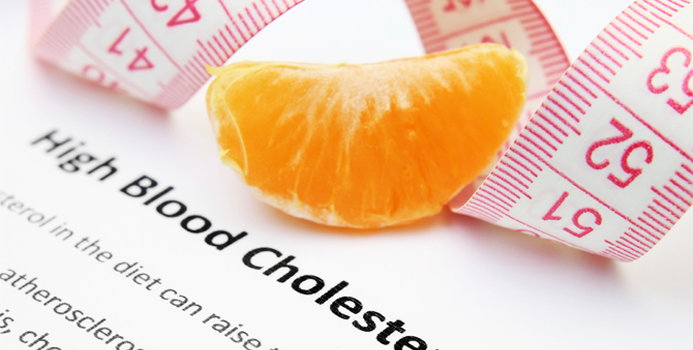High blood cholesterol is a serious condition that increases the risk for heart disease, which is the number one killer of Americans in both men and women. While there are some risk factors that we unfortunately cannot change, such as heredity and age, diet is one factor that we can exert some control over. By making some healthy changes in diet, you can help shift your cholesterol in the right direction and help lower your risk of heart disease.
Reduce Saturated and Trans Fat
Saturated fat is usually solid at room temperature and is found in the greatest amounts in animal products such as meat, whole-milk dairy products and lard. Studies show that too much saturated fat can lead to higher LDL levels. Trans fat, found mainly in processed food products such as margarine or shortenings, baked goods and packaged meals, tends to raise blood cholesterol similarly to saturated fat. The American Heart Association recommends a diet that contains less than 7 percent of its calories from saturated fat and minimal calories from trans fat. Try selecting lean cuts of meat with minimal visible fat or poultry and chicken as red meat alternatives. Also try swapping whole-fat dairy products for their low-fat counterparts to reduce your overall saturated and trans fat intake.
Increase Soluble Fiber Content in Your Diet
Fiber, which comes from plants, is not well digested by your body but is vital for good health. Soluble fiber dissolves into a gel-like substance after ingestion and binds cholesterol, preventing it from being reabsorbed into the bloodstream. Research shows that increasing soluble fiber intake by 5-10 grams each day can result in about a 5 percent drop in LDL cholesterol. In order to bolster your intake, look for hot or cold cereals that contain 3-4 grams of fiber per serving and eat the whole fruit instead of their juiced alternatives. Beans and lentils are also a great source of soluble fiber to add into your daily diet.
Swap to Whole Grains
Whole grains such as whole wheat, whole oats, oatmeal, brown rice and popcorn provide health benefits that are not found amongst refined grains. Eating a diet full of simple carbohydrates such as those found in processed grains and sugar can increase fat and cholesterol levels. Replacing these with three or more daily servings of whole grain foods, as recommended by the Dietary Guidelines for Americans, may reduce the risk of heart disease by 20-30 percent. Eating whole grain pastas, breads and cereals can give your body the energy it needs and also significantly reduce cholesterol levels.
Snack on Nuts
Nuts are packed with protein, fiber, healthy fats, vitamins and antioxidants. Many studies are showing that nuts may have powerful cholesterol-lowering effects when consumed in moderation. Unsalted peanuts and certain tree nuts such as almonds, walnuts, pecans and pistachios are just a few in the nutritional spotlight. Walnuts in particular are high in omega-3s, which can help lower triglyceride levels, improving cholesterol. Almonds have the added bonus of vitamin E, an antioxidant which decreases LDL oxidation. Overall, eating a diet that includes one ounce of nuts daily can help reduce your risk of heart disease and improve your cholesterol levels.
Increase Fruit and Vegetable Intake
The old saying is true -- an apple a day may actually help keep the doctor away. Fruits and vegetables are full of fiber and antioxidants, which both work to lower and improve your cholesterol. They also have the added bonus of being low in saturated fat, which helps explain their inverse effect on LDL cholesterol. Aim for at least 5 servings of fruits and vegetables per day and when cooking, try seasoning with things such as herbs, spices, garlic, lemon juice or vinegar instead of butter or other high-fat items.
While dietary changes may not be able to knock out the cholesterol battle completely, making some of these simple swaps can greatly impact your health and well being. Whether it is enhancing the effects of cholesterol drugs or eliminating them completely, using the diet as a natural way to improve high cholesterol can help you to live a happy, healthier life. 
Sarah Dreifke is a freelance writer based in DeKalb, IL with a passion for nutrition education and the prevention of chronic disease. She holds a Bachelor of Science in both Dietetics and Life Sciences Communication from the University of Wisconsin-Madison. Currently, she is working towards a combined Master's Degree in Nutrition and Dietetics as well as a dietetic internship at Northern Illinois University.



